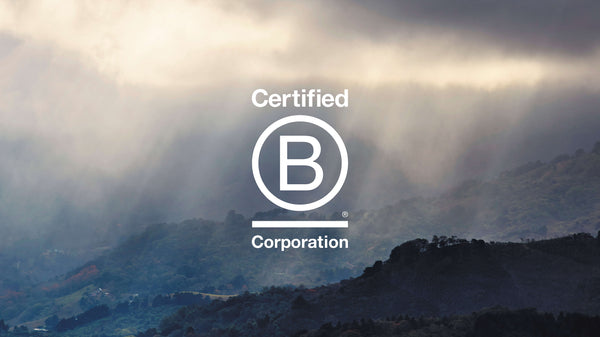Published, Aug 17, 2020
B Corp & UK Speciality Coffee. The Why, The What & The Future.
We live in a time of uncertainty. We’re more aware than ever of the need to consume more consciously. Trying to do our bit to reduce environmental damage and to protect the people producing what we consume. But it’s not always easy to make the right choices. We’re in information overload. Sustainability has become a marketing buzz word which, ironically, makes acting in a sustainable way all that much harder. To add to this there are now over 450 sustainability certifications.
Different industry’s also have their own intricacies to navigate. Speciality coffee is a classic example. We recently read an article that said that B Corp is for business, what Fairtrade is for coffee. And that’s our challenge.
Customers often ask us if we’re Fairtrade certified, as this is a familiar marker of sustainable sourcing. Fairtrade have done an incredible job. They’ve created mass awareness of the need to consumer more sustainably and protect producers. The certification continues to be invaluable in many industries, including coffee more generally. They work with small-scale producers and bring equity where this has previously been missing. However, speciality coffee requires a granularity beyond this.
Coffee is a crop with many different varietals and its profile is affected by terroir on a very local basis. It’s the same as grapes and wineries. The specific area of a farm – or tablon – can produce a different outcome from the same varietal grown elsewhere on it. It’s this level of precision farming – and the processing of the coffee cherry that follows this – that creates the exceptional. The coffees that rate over 80 points in scoring; the grade A coffee. That’s the speciality coffee. In pursuit of exceptional quality, we’re also pioneering and exploratory. We’re seeking new producers and new crops – without being constrained by those working with an existing certification. We then work closely with them, including developing new experimental lots, not only for our own gratification but for the future of the industry. In this respect, some of the well-known certifications are simply too limiting.
The same goes for Organic. Again, another incredible certification. However, this certification costs money for the producers and in some cases is too constraining for them. So if we were to commit to only working with Organic-certified producers, we’d be penalising the most marginal groups, who are still doing great, highly sustainable, work.
The challenge is though, that in sourcing without a certification, we’re setting and then marking our own homework (provenance.co.uk). This requires a great deal of trust from consumers. But it’s too much to ask when the stakes are so high. This is where B Corp comes in. Within their 360 degree audit of businesses, they interrogate the sourcing supply chain. So for speciality coffee roasters, they audit the money that a roaster says they pay to a producer, and makes sure that this is what they receive. As well as this, they review the sustainability of each supplier and their social and environmental impact. It’s impartial verification of sustainable sourcing, in a way that’s relevant for granular sourcing. And, crucially, it’s the only certification out there that measures a company’s entire social and environmental performance.
So B Corp is to business, what B Corp is to speciality coffee. The B Corp community is growing rapidly across the world, with momentum gaining speed in the UK. Expect to see a lot more roasters heading this way. We’re proud to be leading the way and looking forward to the community growing and transparency being a far easier get.

Sources:
www.fairtrade.org.uk/buying-fairtrade/coffee/
www.theguardian.com/business/2019/jul/23/fairtrade-ethical-certification-supermarkets-sainsburys
www.provenance.org/news/movement/fairtrade-response-not-all-food-is-created-equal-who-should-set-the-standards
bcorporation.net/about-b-corps